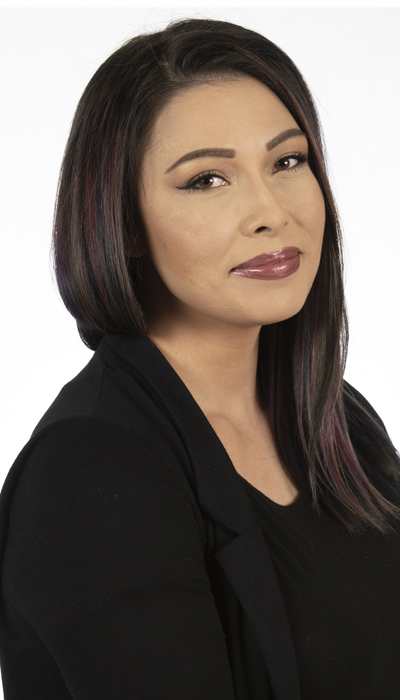- Editorial Offices
- 203 Brantly Hall
- Missoula, MT 59812
- (406) 243-2488
- themontanan@umontana.edu
UM Trailblazers
Front-runners, trailblazers and fearless champions for others. At a sweeping time for women, here are seven UM student leaders making their mark.Abigail Belcher
Lobbyist, Social Justice Activist, Political Navigator
Hometown: Whitefish
At UM: Senior: Business Marketing. President of the Associated Students of the University of Montana.
Trailblazer bio: Belcher found ASUM during her freshman year and immediately became interested in the ways student governance works across higher education. She ran for ASUM Senate the following year, and found herself in Helena as the lobbyist for UM students during the 2017 state legislative session. After learning the nuances of politics and people at the state level, she worked both for Sen. Steve Daines and former gubernatorial candidate Denise Juneau in campaign capacities. Belcher balances her interest in public relations, politics and dialogue with her College of Business coursework, in addition to her seat on 14 different UM committees and regular standing meetings with University administration.
Change-maker status: Belcher is advocating for an emergency grant fund for students, which will allow UM students to remain in school after a financial hardship.
For example, a student can encounter “a” one-time financial hardship that can snowball quickly, and suddenly they’re unable to finish the semester,” she says. “That shouldn’t have to be a deterrent to being able to stay in school.”
Belcher was also instrumental in ASUM’s support of UM’s new Food Pantry, and advocated the pantry be part of ASUM’s organization. Keenly aware of the real financial stress many students face, Belcher says student politics has taught her how to listen.
“I’ve learned so much from getting as many different viewpoints around the table as possible and just listening,” Belcher says. “You have to find a way to make something important for everyone. That’s easier when you take the time to listen and understand their motivations.”
S.E.A. Change motivator: “I’m motivated by the diverse experiences of UM students,” Belcher says. “I’ve realized my experiences afforded to me in student government and politics were largely because of my race, my gender and social class. Even having the finances to run for ASUM requires resources.”
“Having the opportunity to understand the struggles of students from all walks of life and then pair that reality with policy and movement is incredibly motivating. Each student comes to UM with their unique set of circumstances and needs,” she says.
How will you change the world? “Having a seat at the table just because I’m a woman isn’t enough,” Belcher says. “I think male voices tend to be louder than female voices, so we need to try harder to create new habits. That doesn’t mean advocating that women be louder. Instead, I think it’s about emulating dialogue and leadership from a place of equality. Equality in conversation from both men and women is a good start. If we can change the way to talk and hear each other, then there’s a lot we can accomplish.”
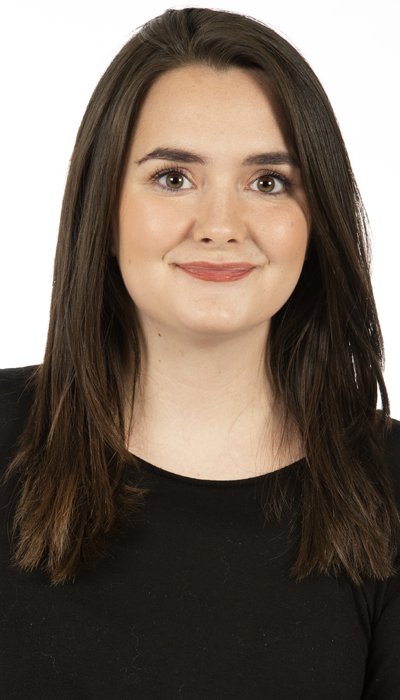
Natasha Kalonde
First Generation American, Voice of Difference, Future Lawyer
Hometown: San Bernardino County, Los Angeles and Bozeman
At UM: Senior: History and Political Science. President of the ASUM Black Student Union.
Trailblazer Bio: The daughter of Zambian immigrants, first-generation American Natasha Kalonde was raised near Los Angeles in southern California. That was, until her father accepted an academic position at Montana State University, and she moved to Bozeman as a junior in high school. She decided to attend UM as she wanted to remain close to family and take advantage of UM’s strong humanities programs.
However, her first semester at UM “was spent mostly in a room by myself,” Kalonde says.
“Missoula was a bigger culture shock than Bozeman,” Kalonde says. “I don’t know exactly why, I just felt a whole lot different from everyone else. It was hard to connect.” Feeling isolated and lonely, Kalonde says her trajectory changed the moment she found the Black Student Union at the recommendation of fellow employee in the UM Food Zoo. In the BSU, she made fast friends in other students of color (whom she calls her “older sisters”) who encouraged her to get involved and make the most out of the experience of being a student of color at a mostly all-white institution.
Now a senior with her sights set on law school, Kalonde uses her time at UM to teach fellow students about experiences of difference.
“For most students here, I’m their experience of knowing a student of color and our experience in life and on campus is not the same as theirs,” she says. “I’ve had to find the confidence to share personal experiences that allow me to better relate to other students and to hopefully widen their perception a bit.”
Change-maker status: Each spring, Kalonde and the BSU organize the Black Solidarity Summit on campus, which brings together students from around the region with a keynote speaker. The event is in its third year and growing in attendance.
S.E.A. Change motivator: “I would like to see more faculty of color outside of African-American Studies or Native American Studies,” Kalonde says. “It’s important for students of color to see themselves reflected in a lot of different fields. I’d also like to see UM include student groups at Orientation, so if there’s students of color joining UM, they see other people like them at the beginning of their academic journey.”
How will you change the world? For years Kalonde watched her parents navigate complicated international paperwork and keep pace with changes in immigration law. Kalonde wants to support families like hers. “I’d like to be an advocate for changing the system, or at least serve as a guide throughout the system,” she says. “From my view, it just doesn’t seem to benefit either party.”
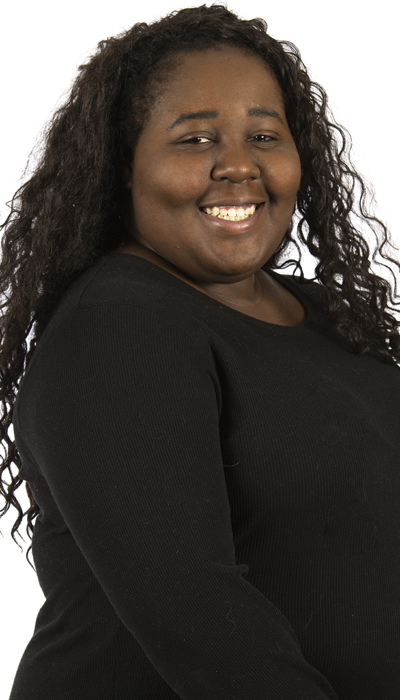
Jordynn Paz
Storyteller, Indigenous Advocate, Writer
Hometown: Garryowen
At UM: Senior: Journalism
Trailblazer bio: As one of only 87 graduating students from Hardin High School to choose UM for college, Paz says she was inspired by the many powerful, educated women in her family to chart her own academic course. A self-described lover of learning who could hold a pencil before she could walk, Paz found UM by way of its nationally ranked journalism program after being told she had a voice for radio, coupled with her own love of writing. She immediately found a welcoming community and home in UM’s Payne Family Native American Center and UM’s American Indian Student Services. She declared a journalism major shortly thereafter and now uses her own words to change the perception of Native people in media as a weekly columnist for UM’s student news organization, the Montana Kaimin.
“I owe my confidence to my mother, grandmother, aunts, cousins – all of the women in my life who told me I was capable of anything,” she says. “I know I’m very lucky to have been always surrounded by educated women who lifted me up.”
Change-maker status: Paz, a member of the Apsáalooke people of Montana’s Crow Nation, currently sits on President Seth Bodnar’s Native American Advisory Council as a student representative. In her time at UM, Paz has served as an ASUM senator, on UM’s Diversity Advisory Council, as president of American Indian Business Leaders and as a member of the Kyiyo Native American Student Association. This year, she got the Kaimin to agree to capitalize the word Indigenous, despite the style rules presented by the Associated Press. “It’s a matter of honoring a distinct people and by capitalizing that word, it recognizes us as sovereign people,” Paz says.
S.E.A. Change motivator: “I’m motivated to change the narrative, the perception and the experience into a better one for Indigenous people and my community,” Paz says. “I want to empower Native people to share their stories under a lens that honors their modern and diverse accomplishments. I want to help pull us from past and acknowledge us as people of the present and do that through writing and journalism.”
Paz also is committed to programs, curriculum and classroom experiences that reflect and enrich the diversity of UM students.
“There are things that make us all different and my experience is not everyone’s experience,” Paz says. “But I do know far how far we’ve come, there is a lot more work to be done in terms of student diversity and providing a deeper awareness.”
How will you change the world? “I know that that stories have power and when they’re told with the intention of making sure everyone has a seat at the table, then we’ll be in the direction we need to be going. I’d like to have an opportunity to travel and write and explore and share the stories that are different from my own. In a way, that’s kind of helping to educate people, and I think that has potential to change the world.”
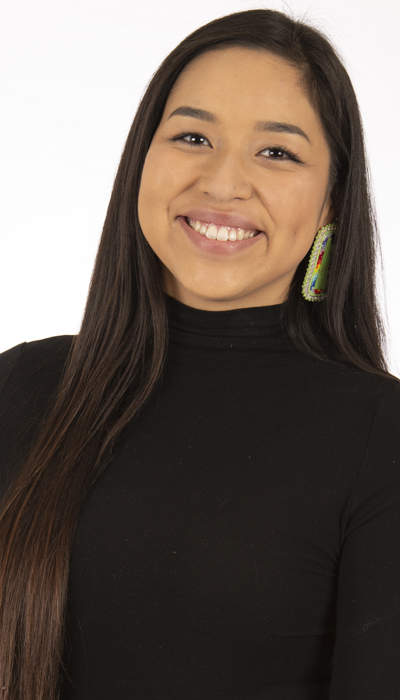
Baleigh Doyle
Confident Contestant, NASA Intern, Mathematics Master
Hometown: Parker, Colorado
At UM: Ph.D. Math Candidate
Trailblazer bio: After earning an undergraduate math degree from the University of Montana Western in Dillon in three years, Doyle was accepted into NASA’s Goddard Space Flight Center internship program. With NASA, she spent two years working across five internships that ranged from computer programming to data analysis in the agency’s Engineering and Technology Directorate. Doyle returned to Montana last summer as a NASA intern at UM’s Flathead Lake Biological Station, where she worked with remote environmental sensors in the station’s SensorSpace Lab advancing the wireless network in and around Flathead Lake. She’s currently in her second year in UM’s Ph.D. program in applied statistics.
Change-maker status: In between math classes and internships, Boyle finds time to compete in beauty pageants that promote inner beauty and intelligence. Her crowns include Miss Teen USA, Miss Colorado USA, Miss Dillon USA and Miss Flathead Lake Montana. Doyle also mentors and tutors students in math courses and is active with the Montana Space Grant Consortium, a component of NASA’s National Space Grant College and Fellowship Program that advances aerospace research and education in Montana.
S.E.A Change motivator: “I’d like to see a lot more women in higher level math,” Doyle says. “STEM fields, especially in management positions, are male-dominated by nature – the disparity is real. I’ve had to become really comfortable at being the only woman in the room, and I’ve learned to see it as an asset.”
“I think getting more women into math has a lot to about confidence,” says Doyle. “When I tutor someone who’s struggling with math, once they start to get it, it’s amazing to see their confidence change along with their math abilities. It’s important for women, and especially young women, to know what a rewarding field math can be and how it opens so many more doors.”
How will you change the world? “I’d like to see a world where people feel safer and more comfortable talking to each other without fear of being judged,” she says. “The more dialogue and questions, the better. I see math as a way to connect; basically you have a hard problem that you need to solve. I do that by breaking it apart, assigning different people parts of the problem, and then bringing everyone together to solve it. You need diversity of ideas of solve complex problems. We’re stronger together.”
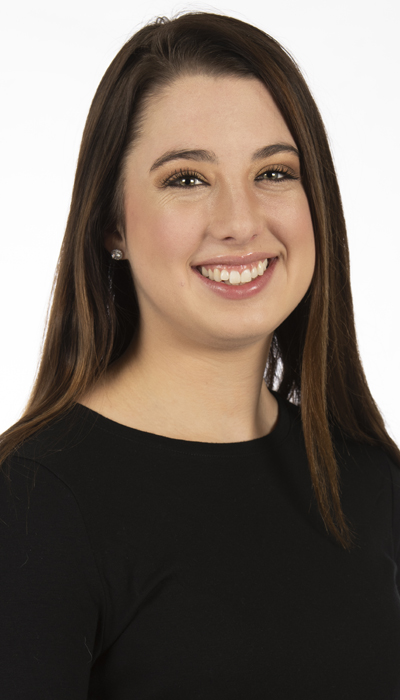
Evelyn Wall
Activist, Transgender Champion, Outdoor Equalizer
Hometown: Billings
At UM: Postbaccalaureate: Computer Science.
Trailblazer bio: Evelyn Anthony Wall graduated from UM with a bachelor’s degree in biology with an emphasis in genetics and evolution in 2016. Shortly after graduation Evelyn joined a genetics lab at the Howard Hughes Medical Institute Janelia Research Campus. About a month into her new job at HHMI, she decided to leave. The years she had spent chasing the most fundamental truths of biological origins couldn’t erase one glaring truth about herself. She took a job in Juneau, Alaska, as a sailing and glacier guide for a summer. After returning from the remote corners of Alaska, she made her biggest decision yet. In 2018, Evelyn decided to publicly transition and began living full time as a woman. Since then, Evelyn has become a trusted and active voice seeking greater equity and support for the LGBTQ+ community at UM and in Missoula.
Change-maker status: Wall is the founder and director of Out There Missoula, an ASUM student group that creates spaces for LGBTQ+ people in the outdoors and lowers the barriers of entry for LGBTQ+ people into outdoor jobs. In the group’s first year, more than 300 people have used the outdoor recreation trips and trainings offered by Out There Missoula. Trainings teach everything from the technical skills of spinal stabilization to operating a mountaineering rig-and-pully system.
Additionally, Wall founded The Missoula Restroom Equity Group, a direct action network collaborating with UM’s brand new Innovation Factory. The organization’s mission is to prototype and manufacture gender-neutral bathroom signs for downtown Missoula businesses. Evelyn also works directly with members of the transgender community that need help accessing emergency housing and safe workplaces.
S.E.A. Change motivator: “There are blind spots in the ways in which we identify barriers to student success,” she says. “If we’re ever going to make real progress toward greater equity we must give up our power of decision making to those with the least power of all. We must build stages and microphones and then we must listen carefully.”
When it comes to the outdoor recreation industry and representing LGBTQ+ people, Wall says there is a lot of improvements to be made.
“Queer people need wild spaces just as much as anyone else does,” Wall says. “More importantly, we need queer people and people of color to be in outdoor leadership positions, particularly in the 18-to-30 age range of outdoor guiding. They need to be in those positions not only for a fun paid job, but to challenge and normalize their presence in that world in front of the sector of people who pay for those services.”
How will you change the world? “I want to level the playing fields that we assume are already level,” she says. “I want to hopefully change the way we think about going about manifesting equity, and I don’t want to waste resources doing that. I have found success in putting people and programs into direct action that keep queer people safe. As long as that service model is needed and it’s making a difference, I’m going to be there.”
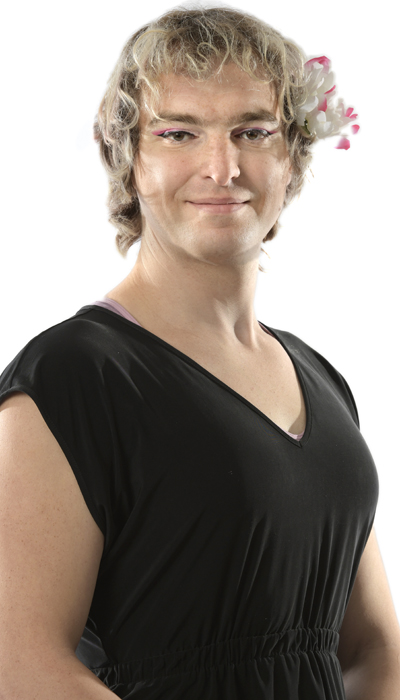
Ashtyn Carlson
Cowgirl, Entrepreneur, Rodeo Record Holder
Hometown: Loma, Colorado
At UM: Junior: Marketing. UM Grizzly Rodeo Athlete
Trailblazer bio: Carlson recently transferred to UM from the College of Southern Idaho, and she’s making strides in the rodeo arena and in the classroom. Last year, Carlson won first place in barrel racing at the Collegiate National Finals Rodeo, helping her team win the National Reserve Women’s Team title. Before that, she won the reserve women’s all-around title and the reserve champion barrel racing title for the Rocky Mountain region. In 2018, she took home the title for National Barrel Racing Rookie of the Year and qualified the past two years to compete in goat-tying and barrel racing at the college finals.
Change-maker status: In addition to academics and rodeo, Carlson also owns and operates ABC Performance Horses, branded after her own name – Ashtyn Bree Carlson. Calling the company her “side hustle,” she trains and markets rodeo horses in her spare time between rodeo circuits. Her business acumen landed her a sponsorship from the app Rodeo Buddy, which tracks horse sales and training characteristics. She’s also sponsored by MVP Horse Supplements, Rock & Roll Denim, Panhandle Western Wear, Heart4Brand, and A Heart for Horses Inc. – a Montana horse rescue nonprofit.
S.E.A. Change Motivator: “I’m inspired by the female culture in rodeo,” Carlson says. “In any individual sport, it’s going to get really competitive,” she said. “But in rodeo, people just want to see you do your best. I love that part about it.”
“Being a student at UM not only allows me to be a part of a supportive, kind community, but it also allows me to pursue my dreams in and out of the arena,” she says. “I’m fortunate enough to continue my education at a prestigious University with a remarkable business college.”
How will you change the world? “In the rodeo industry, women aren’t allowed to compete in Team Roping at the professional level, and they only have one event at the National Finals Rodeo compared to the eight events men have (including the All-Around). Even though I’ve earned a good chunk of my accomplishments barrel racing (the one NFR event for women), I’m constantly striving for that prestigious All-Around title.”
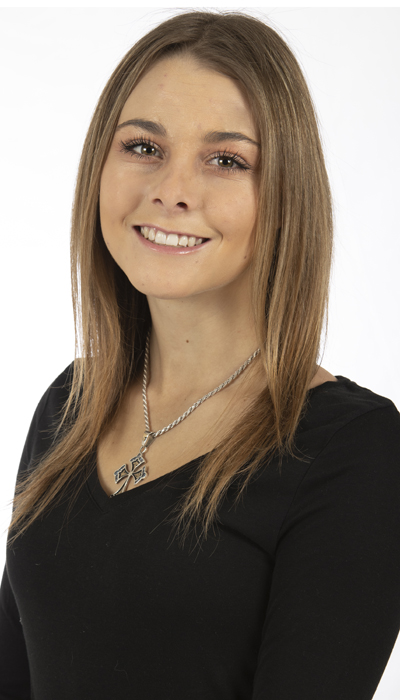
Jessi Kopperdahl
Mother, Neuroscientist, Mentor
Hometown: Billings
At UM: Junior, Neuroscience, TRIO Mentor
Trailblazer bio: In 2011, Kopperdahl arrived on the UM campus as a new mother, a first-generation college student and a Native woman without a support network 400 miles from home. She struggled to find a community, the resources to thrive and she felt terribly isolated. She returned home to care for her young child until she could establish a support network at UM. Her grandmother always told her even through illness to be sure to get an education, because it can never be taken away. The passing of her grandmother in 2014 was Kopperdahls’ motivation to pack the car and head back to UM once more. This time, with a second child and more determination.
“I just started researching all of the programs available to people like me and the resources on campus, because I knew I had to make it work,” Kopperdahl says.
On one particularly overwhelming day, Kopperdahl walked into UM’s TRIO Student Support office “and completely fell apart,” she says. Kopperdahl said the UM TRIO staff immediately welcomed her, and empathized with the very real struggles of a non-traditional student and single mother pursing a college degree. They helped her find resources, navigate financial aid and did everything possible to get her to stay in school. It worked. Kopperdahl is now a junior in UM’s neuroscience program conducting her own research in a lab.
Change-maker status: Kopperdahl regularly mentors other first-generation students on campus and served as a panel member this fall for UM’s National First Generation Student Day. She also takes upper division neuroscience coursework, UM’s newest academic major, and works in an evolutionary genomics lab under Dr. Jeffrey Good, where she is mentored by Dr. Emily Moore, a postdoctoral student. She says she balances her Indigenous knowledge (Kopperdahl is Blackfeet and Sioux) with cutting-edge science practices, “and tries to see one as complementing the other.”
S.E.A. Change motivator: “I’m inspired by students who struggle and are open about it, because the easy thing is to keep quiet about the struggle and that’s when people can feel invisible or even quit school altogether because they think it has to be that way,” Kopperdahl says.
How will you change the world? “I want to go as far as I can in my educational path in science,” she says. “I want to work with students in academia who share similar experiences as me. I didn’t come from a family that was educated or stepped beyond what was already written for them. I want to eventually inspire and continue to help other students who are like me – who didn’t take a traditional route to education but made their own path.”
